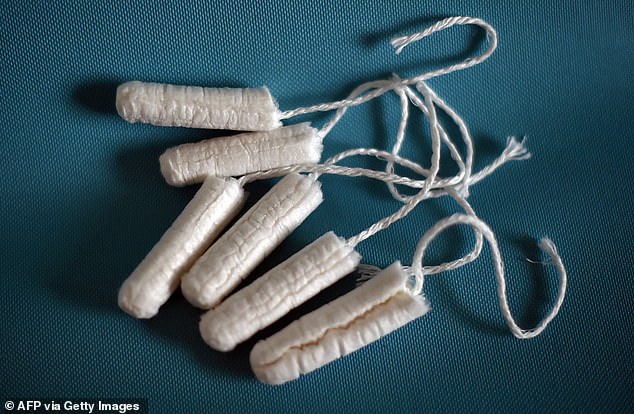Women today called on tampon brands to urgently review levels of toxic metals in their products amid growing safety fears.
Tests on 30 products purchased in New York, Athens and London found some contained dangerous levels of arsenic, chromium and even lead.
MailOnline contacted investigators to ask which 14 brands were involved and they declined to comment.
Instead, they stressed that while tampons could be “a potential source of metal exposure” for women, more research is needed first to assess their danger.
However, one woman called the findings “unreal” and claimed “women are literally being poisoned by these products”.
Tests on 30 products purchased in New York, Athens and London have found that some of them contained dangerous levels of arsenic, chromium and even lead. All 16 metals analysed were found in at least one tampon. But the American investigators who carried out the investigation decided not to reveal the names of the 14 brands involved.

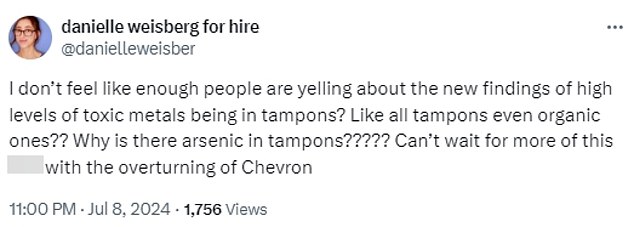
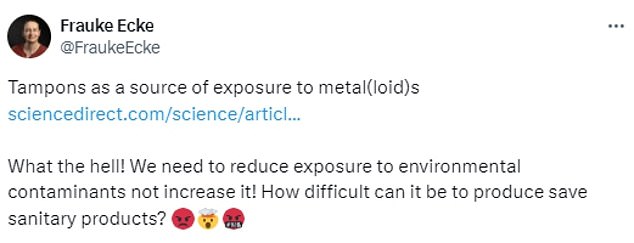

Women took to social media to express their shock and concern over research that found tampons contained toxic metals – however researchers have refused to reveal which 14 brands they tested.
Another, @danielleweisber, who also used X/Twitter, wrote: ‘I don’t feel like enough people are shouting about the new findings of high levels of toxic metals in tampons.
“Like all tampons, even organic ones? Why is there arsenic in tampons?”
A third user, @FraukeEcke, added: “What the hell! We need to reduce exposure to environmental pollutants, not increase it! How hard can it be to produce safe medical devices?”
A fourth also said: “The real question is how long these companies have had this information.”
Potential exposure to heavy metals through tampons is concerning given the thin nature of the vaginal tissue, which could provide an easy pathway for these substances to enter the body.
Exposure to lead can harm brain development, while other metals can cause potentially fatal blood clots and increase the risk of some types of cancer.
The findings are also potentially far-reaching, as they involve… Between 50 and 80 percent of menstruating women use tampons monthly. — for several hours at a time.
In the study, the 16 metals analyzed included arsenic, barium, calcium, cadmium, cobalt, chromium, copper and iron.
Others included manganese, mercury, nickel, lead, selenium, strontium, vanadium and zinc.
The researchers identified examples of all 16 among the tampons tested.
Several metals were detected in all samples, including arsenic, cadmium, chromium, lead and vanadium.
Among these, lead had the highest concentration, with a total mean of 120 nanograms per gram (ng/g).
Cadmium followed with 6.74 ng/g, and arsenic with 2.56 ng/g.
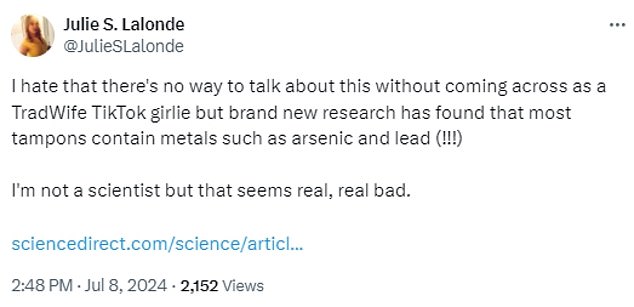
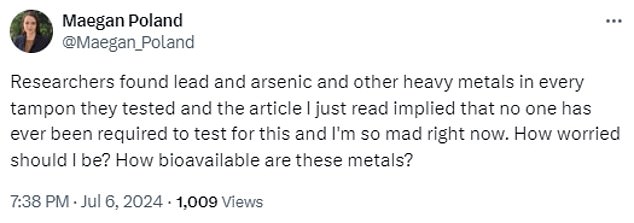
In the study, the 16 metals analyzed included arsenic, barium, calcium, cadmium, cobalt, chromium, copper and iron. The researchers identified samples of all 16 among the tampons analyzed.
Writing in the diary, International EnvironmentThe researchers said: “There is no safe level of lead exposure.
‘Any amount of lead that can leak from a tampon and reach the systemic circulation could contribute to negative health consequences.’
No brand or type of tampon had noticeably lower levels of metals overall, they added.
Organic tampons had higher levels of arsenic, but nonorganic tampons had higher levels of lead.
The authors said there were several ways the metals could have become embedded in the tampons in the first place.
One was that cotton plants used to make tampons could have absorbed metals from soil and water, especially when there are contaminants nearby – for example, a cotton field near a lead smelter.
They can also potentially be added during manufacturing processes as bleaches, antibacterial agents or through cross-contamination from other factory processes.
But women who took to X/Twitter questioned the impact this had on tampon users.
“The article I just read implies that no one has ever been required to take this test and now I’m very angry,” wrote one.
“How concerned should I be? How bioavailable are these metals?”
Another added: ‘New research has found that most tampons contain metals such as arsenic and lead (!!!).
“I’m not a scientist, but this looks very, very bad.”
Dr Jenni Shearston, co-author of the study and an expert in air pollution epidemiology at the University of California, Berkeley, said: ‘Despite this huge potential for public health concern, very little research has been done to measure the chemicals in tampons.
‘As far as we know, this is the first paper to measure metals in tampons.
“It is worrying that we found concentrations of all the metals we analyzed, including toxic metals such as arsenic and lead.”
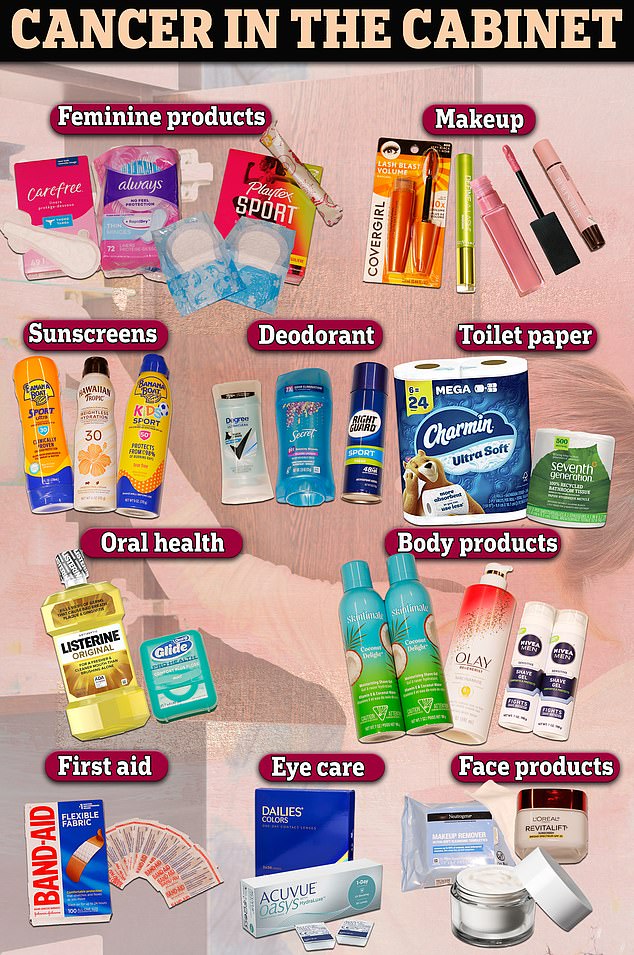
The report comes just weeks after US consumer advocacy group Mamavation and the Environmental Working Group also suggested that tampons could contain harmful perfluoroalkyl substances, or PFAS. These are known as “forever chemicals” because they can linger in the environment for hundreds of years and have been linked to everything from cancer and high cholesterol to infertility.
He added: “I really hope that manufacturers will be forced to test their products for metals, especially toxic metals.
“It would be exciting to see the public call for this or ask for better labeling on tampons and other menstrual products.”
Meanwhile, Professor Kathrin Schilling, an adjunct professor and geochemist at Columbia University, said: “Although toxic metals are ubiquitous and we are exposed to low levels at any given time, our study clearly shows that metals are also present in menstrual products and that women may be at increased risk of exposure when using these products.”
However, other experts urged women not to panic, warning that “there is no evidence that metals leach into menstrual blood.”
Professor Atholl Johnston, emeritus professor of clinical pharmacology at Queen Mary University of London, told MailOnline: “I don’t doubt the results of the research, but I do doubt the bioavailability of the metals found in tampons.
‘Prior to analysis, the buffers were sheared and then the researchers added 2 ml of 67-70 percent nitric acid (HNO3) to each sample and predigested the buffers at room temperature overnight before microwave-assisted acid digestion.
‘A very similar environment to that of an average vagina.’
She added: ‘If I were a woman who uses tampons, I wouldn’t panic at this stage.
‘There is no evidence that metals leak into menstrual blood and are absorbed by the body.’
This comes just weeks after US consumer protection group Mamavation and the Environmental Working Group also suggested that tampons could contain harmful perfluoroalkyl substances, or PFAS.
They are called “forever chemicals” because they can remain in the environment for hundreds of years and have been linked to everything from cancer and high cholesterol to infertility.
Mamavation found that popular Playtex tampons, Always panty liners, and Carefree panty liners, all sold in the U.S., tested positive for organic fluoride, a chemical that contains known PFAS.
Last year, some period panties sold at major UK retailers were also found to contain high levels of silver.
Silver is used as an antimicrobial agent and is commonly added to menstrual panties to combat users’ concerns about odor and hygiene.
However, scientists have discovered that nanosilver can kill lactobacilli, the healthy bacteria in the vagina that help fight infections.
This can put period panty wearers at greater risk of contracting harmful bacteria, which can potentially lead to an increased risk of bacterial infections and pregnancy complications.


